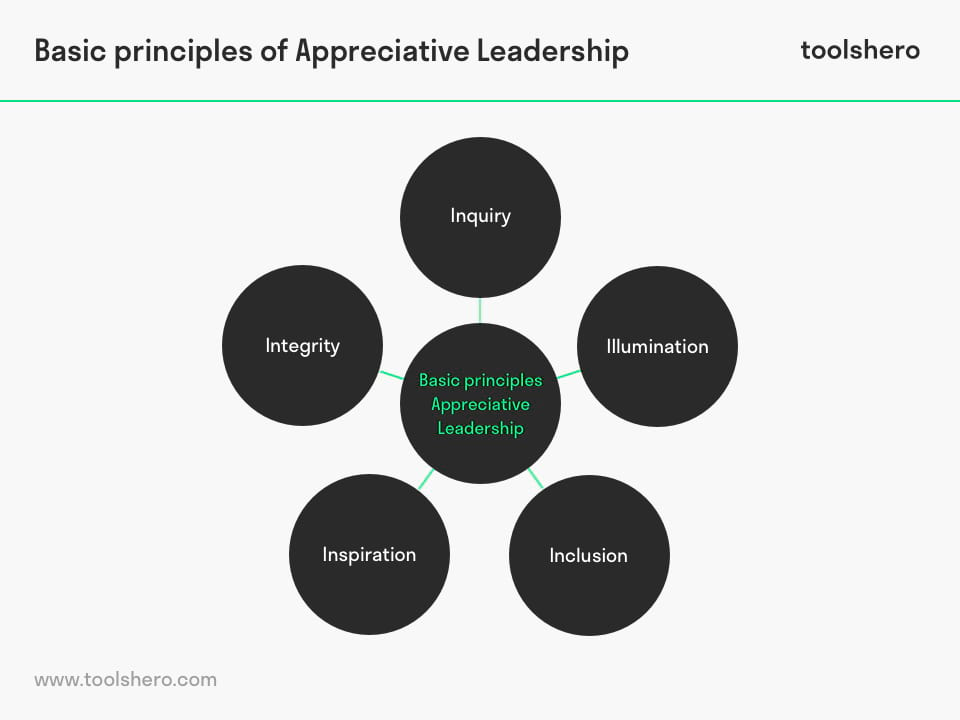Appreciative Leadership: theory and principles

Appreciative Leadership: this article provides a practical explanation of Appreciative Leadership. Next to what this leadership style is (theory), highlights this article also the five principles of Appreciative Leadership, the efcct on Organisational Culture and Change and the Relation between Appreciative Leadership and Transformational Leadership. After reading this article, you will understand the basics of this powerful leadership style. Enjoy Reading!
What is Appreciative Leadership? The theory
Appreciative Leadership is a form of leadership that shares the conviction that working together is more important than authority. The success of each organisation depends on combining the strengths of everyone involved. This form of leadership inspires confidence, and it boosts people’s energy, enthusiasm and good performance.
To summarise, Appreciative Leadership is about relational processes and methods that enable people to work together effectively in order to make things happen. The theory also paints a positive view of the world based on the belief that every individual has potential.
The core of this form of leadership is therefore the recognising of that potential and to transform it into positive strengths. Together, these ideals represent a shift in leadership. From a traditional and individualistic approach to leading, to a new standard that helps the leader to achieve the desired results.
The foundation of the Appreciative Leadership theory can be traced back to an older theory. That model is known as Appreciative Inquiry (AI); a change vision and strategy.
The main idea of that theory is that the system will develop in positive ways when people are inquisitive together. It is a highly participatory style of leadership that is about asking strategic questions about collectivity, strengths and weaknesses, performance, success stories, traditions and visions for the future.
Five principles of Appreciative Leadership
The basic principles of Appreciative Leadership are the same as those of the Appreciative Inquiry approach for organisational change. The authors introduced five core strategies of Appreciative Leadership.
The strategies respond to the needs people have that drive them to perform well:
- Being a part of something
- Feeling valued
- Knowing what the organisation is heading for
- Feeling they’re contributing to the greater good
- Knowing that excellence is expected of them

Figure 1 – the principles of Appreciative Leadership
Inquiry
Inquiry enables people to know that their contributions are appreciated. It’s important that the leader asks their team what their thoughts and feelings are. Next, the leader has to listen to them sincerely and say that they appreciate the people and their input.
Illumination
Illumination helps individuals to understand the best ways to contribute. By practising this, the leader gets to learn more about the people in their team and their strengths, as well as the strengths of others.
That way, individuals are challenged to express themselves, take risks and support others in working from their strengths.
Inclusion
Inclusion gives people the feeling of being connected to others. When inclusion is practised in a group, it opens the door to collaboration and co-creation.
This stimulates an environment in which people feel like they’re a part of something. The result is a strong sense of connection and inclusion, which is good for productivity.
Inspiration
Inspiration gives people a sense of direction. By sharing a vision and plotting a course, a team becomes hopeful and energetic. This is the basis for transformation, innovation and long-term performance.
Integrity
In the theory of Appreciative Leadership, integrity is about the fact that people know what is expected of them, that they do their best for the greater good and that they trust others to do the same. A person with integrity setting an example serves as a standard for the others to live up to.
Appreciative Leadership: Organisational Culture & Change
There’s often a diverse spectrum of employees within any organisation. Together they make up the organisational culture that is shaped by the language, customs, relationships and interpersonal constructions.
The quality of those determines how harmonious, creative, productive, energetic or destructive that culture is. An organisation’s culture can promote inclusion, but exclusion too.
That means the corporate culture can lift people up, but also let them down. Through the use of Appreciative Inquiry and Appreciative Leadership, leaders attempt to elevate people to greater heights and get the most out of their performance.
Appreciative Leadership is a reinforcing way of leading people to embrace institutional as well as human and organisational change. The five cores offer a structured approach to encourage people within an organisation and to guide them into the direction they prefer to go.
Appreciative leaders point out their employees’ strengths, core abilities, successes, and invites them to form an idea of the future and go for that. Appreciative leadership initiates and stimulates projects and partnerships, opportunities and other worthwhile developments.
These are all things that contribute to expanding the network and the connection between different stakeholders. Change that is guided by Appreciative Inquiry (AI) is long term and increases well-being and growth.
Relation between Appreciative Leadership & Transformational Leadership
There are several similarities between the core principles of Appreciative Leadership and Transformational Leadership. It’s not just the idealistic vision of both styles that is similar, but inspiring motivation, intellectual stimulation and individualised considerations apply to both models too.
There’s also a degree of overlap between the two theories and how they’re conceptualised. The authors have adopted the theory and method of Appreciative Leadership and translated it into an attitude and approach of leadership that can be implemented in practice in relatively concrete ways.
There’s one noteworthy and important difference however. Appreciative Leadership is clearly very young compared to Transformational Leadership. This mainly refers to the amount of research that has been done in an attempt to determine the similarities and overlap with organisations and their Key Performance Indicators (KPIs).
Now It’s Your Turn
What do you think? Do you recognise this explanation of Appreciative Leadership? Would you be able to apply the AI philosophy in your surroundings or present-day organisations? Do you agree with the above, or do you have anything to add? What do you think some of the factors within leadership are that contribute to an effective and productive team?
Share your experience and knowledge in the comments box below.
More information
- Whitney, D. K., Trosten-Bloom, A., & Rader, K. (2010). Appreciative Leadership: Focus on what works to drive winning performance and build a thriving organization. New York, NY: McGraw-Hill.
- Keefe, M. R., & Pesut, D. (2004). Appreciative Inquiry and Leadership Transitions. Journal of Professional Nursing, 20(2), 103-109.
- Lewis, D., Medland, J., Malone, S., Murphy, M., Reno, K., & Vaccaro, G. (2006). Appreciative Leadership: Defining Effective Leadership Methods. Organization Development Journal, 24(1).
How to cite this article:
Janse, B. (2019). Appreciative Leadership. Retrieved [insert date] from Toolshero: https://www.toolshero.com/leadership/appreciative-leadership/
Original publication date: 03/26/2019 | Last update: 10/31/2023
Add a link to this page on your website:
<a href=”https://www.toolshero.com/leadership/appreciative-leadership/”>Toolshero: Appreciative Leadership</a>












